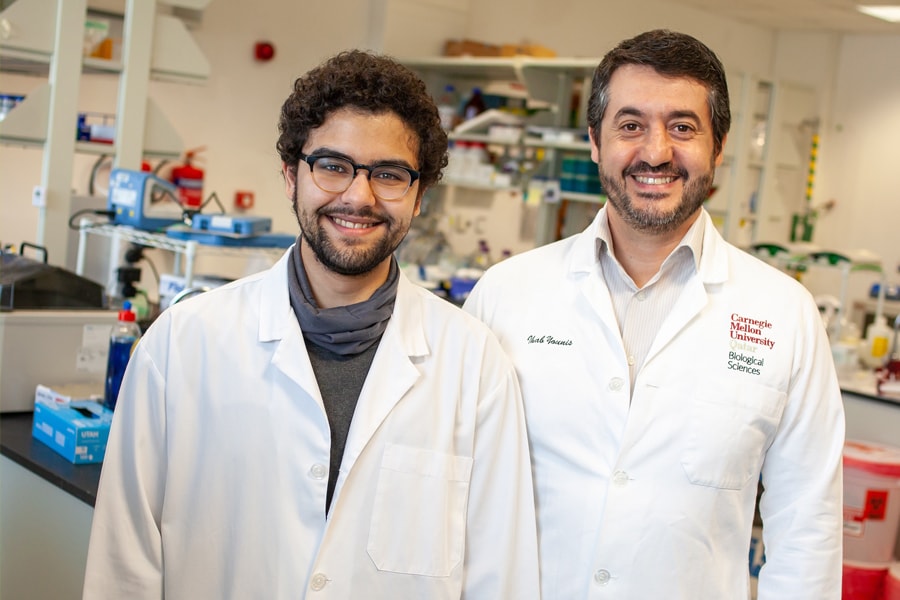
New Avenue of Investigation for Cancer Therapy Discovered at Carnegie Mellon Qatar
Project inspires CMU-Q alumnus to pursue career in cancer research
- BLJ Worldwide
- +974 33531316
- Carnegie Mellon University in Qatar
- +974 4454 8490
A team of researchers at Carnegie Mellon University in Qatar (CMU-Q) has discovered a new area of research that could lead to more effective cancer treatment with fewer side effects.
Ihab Younis, assistant professor of biological sciences, and Ettaib El Marabti, a 2017 graduate of CMU-Q's Biological Sciences Program, have revealed that the cellular mechanism called minor intron splicing is different in cancer cells than in normal cells.
Younis' research has focused on the role of introns for more than 10 years. The genes of many organisms have stretches of non-coding DNA that interrupt the sequences that code for protein. These non-coding sequences, which are called introns, must be removed, and the remaining sequences must be spliced back together to produce messenger RNA that is ready to be translated into protein.
"This research has been very much data driven," he said, noting that his initial work in the area focused on the role of introns in neurodegenerative disease. "it was noticed early on that minor introns, which make up only 0.4 percent of introns, are often inefficiently spliced. This is puzzling, since the proteins encoded by genes containing minor introns perform important roles in the cell. Our results suggested that the splicing mechanism acted like a molecular switch that could help cells adapt to stress and other changes."
Younis and El Marabti then compared the minor intron sequences of healthy cells and cancer cells. They found that cancer cells appear to have a faulty splicing mechanism. This finding, outlined in a paper titled "The cancer spliceome: Reprogramming of alternative splicing in cancer," was published in Frontiers in Molecular Biosciences.
"We do not suggest the use of this type of therapy would replace traditional therapies," Younis said. "Rather, targeting the cells in this way would work in combination for more effective treatment with fewer unfavorable side effects."
"Carnegie Mellon as an institution is built on the belief that research should have an impact on people's lives," said CMU-Q Dean Michael Trick. "Ihab and Ettaib's research could have important implications in the treatment of cancer."
Younis is now looking into select minor introns in cancer cells that appear to target tumor suppressors. "This area of the cancer research is very new, but the body of research is growing as more labs look at the role of alternative splicing of messenger RNA in cancer cells. It's an exciting avenue to explore," said Younis.
Igniting a passion for research
When he joined the CMU-Q faculty in 2015, Younis sought out students who could help him establish his research lab. El Marabti, then a third-year student, was given the task of analyzing the sequence of the genetic codes of the minor introns of normal and cancerous cells.
"I learned that I love research because of this project with Dr. Younis," El Marabti said.
The project grew, and in 2017, El Marabti presented his findings at the Keystone Symposium on mRNA Processing and Human Disease in New Mexico, as well as CMU-Q's research symposium, Meeting of the Minds. El Marabti took the top prize at Meeting of the Minds 2017.
After graduating in 2017, El Marabti began medical school at Weill Cornell Medicine-Qatar. The paper was completed while El Marabti was a first-year medical student.
"Every time I ask him to help, he has always been more than generous with his time," Younis said. "He finishes his day at Weill Cornell and comes here to work on the computational parts of the project."
El Marabti said he intends to incorporate research into his career as a physician.
"I spent the summer doing research at Memorial Sloane Kettering working in a similar area," he said. "I'm not sure what field I would like to pursue when I finish medical school, perhaps oncology, but I know that research will be a part of my career."
Carnegie Mellon University in Qatar offers undergraduate degree programs in biological sciences, business administration, computational biology, computer science and information systems. Students are encouraged to participate in research to hone their skills in creative problem solving and scientific inquiry.